Flickr CC World Bank
Swiss HIV prevention policy for intravenous drug users is a model for success
Switzerland's pragmatic HIV prevention policy for intravenous drug users has been extremely successful. Thousands of HIV infections and AIDS cases have been prevented thanks to harm reduction measures, as shown by an analysis by the University of Zurich, the University Hospital Zurich and the Swiss HIV Cohort Study.
Researchers at the University of Zurich, the University Hospital Zurich were able to document and quantify the success of measures taken for the prevention of HIV transmission through intravenous drug use in Switzerland, based on a mathematical model and detailed clinical, viral genetics and epidemiological data from the Swiss HIV Cohort Study. Harm reduction measures such as needle exchanges, methadone programs, supervised heroin programs and contact and consultation services for drug users were all analyzed. Marzel and his colleagues could demonstrate through their work that the measures in Switzerland had prevented a total of over 15,000 HIV infections among drug users. "Previously, the HIV epidemic frequently spilled over from intravenous drug users to the general population through sexual contact, meaning that the prevention measures in drug users also indirectly prevented more than 2,500 cases of HIV infection in people who do not use intravenous drugs," says Prof. Roger Kouyos, head of the study, which was recently published in the journal Open Forum Infectious Diseases.
